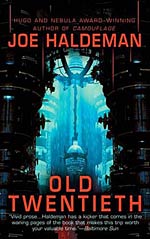
![]() charlesdee
charlesdee
8/27/2013
![]()
The Becker-Cendrek Process made death by natural causes a thing of the past. Of course the procedure was spectacularly expensive and initially available only to the fabulously wealthy. As it went further into production, the price began to come down. Soon the super, super wealthy could afford it; then the merely super wealthy. By the time the very, very wealthy could buy in, discontent began to grow among those who were stuck with their normal life spans. But the price could only come down so far until Becker-Cendrek made back their predictably high R&D costs. War broke out, a conflict known as the Immortality War. It was vicious, but the solution was outrageous. A pathogen known as Lot 92 wiped out that part of the world population that had not yet taken the BCP pill. Earth's populations dropped from the billions to just around 200 million.
As you might expect, those 200 million immortals were not the best equipped to keep public utilities running, or for that matter to fix their own plumbing. But mankind over the centuries pulled things together. Science and technology got back up and running and society adjusted to the prospect of a very long future with little change in the neighborhood. In vitro fertilization and the much chancier prospect of natural childbirth, which involves going off the BCP treatment for the term of the pregnancy, stabilized the population at around a billion. But an inevitable amount of tedium set in. When an earth-like planet is discovered near Beta Hydrii, the nearly thousand year journey to explore it is swamped by applicants looking for a change.
One of those applicants is Jacob Brewer, a first generation immortal, although not from an fabulously wealthy family. His family had a tradition of buying a case of good wine for each birth, a case to used sparingly for special occasions. Jacob's grandfather had the good fortune of buying a case of Chateau Mouton-Rothschild 1945, which would become on of the most valuable wines in history and the Brewer family's early ticket for immortality. Jacob is a virtuality engineer, trained to maintain the time machines that allow users to enter virtual recreations of any moment in history that has been sufficiently researched to become part of the time travel menu. Most of those destinations are in the twentieth century, "The Old Twentieth," and travelers may have a taste for the Paris of Hemingway and Fitzgerald or the battlefields of Viet Nam.
Haldeman's novel opens with Jacob having the lower half of his body blown off at Gallipoli, but hey, it's a virtual experience. His fellow travelers show him a choice of postcards he can study and choose an escape route from the gore-soaked foxhole in Turkey, He opts for London.
Old Twentieth, alternates between life on the Aspera, the ship bound for Beta Hydrii, and the time spent in virtual reality by Jacob and his crew as they maintain the understandably popular time machine on the milleneum-long voyage. Haldeman's best writing is in his recreation of the Old Twentieth environments where his military background serves him well. Although life on the Aspera has its romantic and bureaucratic complications and there is one funny scene involving ducks, the novel is at its liveliest in the virtual world of the time machine. And then people begin to die.
The deaths may be related to the time machine, but reports from earth convey news of similar deaths occurring on the home planet. Jacob's final trip into the machine, which may have become a sentient AI, takes the novel into new territory that makes Old Twentieth Haldeman's best exploration of what constitutes a human life when the normal constraints of time have been removed since he explored similar themes in Forever War and Forever Free.
http://www.potatoweather.blogspot.com